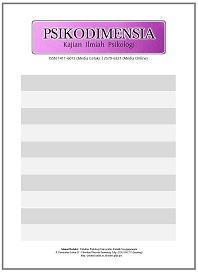Perbedaan Kelelahan Emosional Ditinjau dari Jenis Kelamin dan Status Perkawinan pada Pengajar di Sekolah Kristen
Abstract
Pengajar memiliki peran yang beragam, yaitu sebagai rekan kerja, administrator, siswa, dan orang tua. Terlebih lagi pengajar di Sekolah Kristen diharapkan menjadi panutan bagi siswa dalam menerapkan nilai-nilai Kristiani. Beban kerja dan tantangan yang dihadapi oleh pengajar dapat mengakibatkan stress. Stress yang tidak terselesaikan dapat terakumulasi menjadi kelelahan emosional. Laki-laki dan perempuan merespon dan menerapkan strategi yang berbeda ketika menghadapi masalah. Juga, terdapat dukungan sosial yang berbeda pada pengajar yang telah menikah dan belum menikah. Penelitian ini ingin menguji perbedaan kelelahan emosional yang ditinjau dari jenis kelamin dan status pernikahan pengajar di Sekolah Kristen. Penelitian ini menggunakan Maslach Burnout Inventory dimensi kelelahan emosional kepada 102 pengajar di Sekolah Kristen, berdomisili di Surabaya. Hasil penelitian menunjukkan bahwa tidak ada perbedaan kelelahan emosional yang signifikan antara pengajar laki-laki dan perempuan (p = 0,409), serta pengajar yang telah menikah dan belum menikah (p = 0.766). Hal ini mengindikasikan bahwa pengajar laki-laki dan perempuan memiliki tingkat kelelahan emosional yang serupa, begitu pula pengajar dengan status perkawinan telah menikah dan belum menikah.
Keywords
Full Text:
PDF (Bahasa Indonesia)References
Artz, B., Kaya, I., & Kaya, O. (2021). Gender role perspectives and job burnout. Review of Economics of the Household, 20(2), 447–470. https://doi.org/10.1007/s11150-021-09579-2
Balhara, Y. P. S., Verma, R., & Gupta, C. S. (2012). Gender differences in stress response: Role of developmental and biological determinants. Industrial Psychiatry Journal, 20(1), 4. https://doi.org/10.4103/0972-6748.98407
Bozkus, K. (2020). Examining the problems faced by teachers: The case of Şanlıurfa. Journal of Theoretical Educational Science, 13(3), 505–529. https://doi.org/http://dx.doi.org/10.30831/akukeg.623710
Cheng, A., Lee, M. H., & Djita, R. (2022). A cross-sectional analysis of the relationship between sabbath practices and us, Canadian, Indonesian, and Paraguayan teachers’ burnout. Journal of Religion and Health. https://doi.org/10.1007/s10943-022-01647-w
Chirico, F., Sharma, M., Zaffina, S., & Magnavita, N. (2020). Spirituality and prayer on teacher stress and burnout in an Italian cohort: A pilot, before-after controlled study. Frontiers in Psychology, 10. https://doi.org/10.3389/fpsyg.2019.02933
Ciuluvica, C., Fulcheri, M., & Amerio, P. (2019). Expressive suppression and negative affect, pathways of emotional dysregulation in psoriasis patients. Frontiers in Psychology, 10. https://doi.org/10.3389/fpsyg.2019.01907
Cruickshank, V. (2014). Challenges faced by the male primary teacher. The Future of Educational Research, 87–97. https://doi.org/10.1007/978-94-6209-512-0_8
Dela Cruz, A. (2020). Direct and indirect factors affecting teachers’ burnout in the new normal. Recoletos Multidisciplinary Research Journal, 8(2), 75–86. https://doi.org/10.32871/rmrj2008.02.06
Edú-Valsania, S., Laguía, A., & Moriano, J. A. (2022). Burnout: A review of theory and measurement. International Journal of Environmental Research and Public Health, 19(3), 1780. https://doi.org/10.3390/ijerph19031780
Gravetter, F. J., & Forzano, L.-A. B. (2018). Research methods for the behavioral sciences. Cengage.
Hajihasani, M. (2017). Marital conflict and job burnout. Ergonomics International Journal, 1(4). https://doi.org/10.23880/eoij-16000123
Jamaludin, I. I., & You, H. W. (2019). Burnout in relation to gender, teaching experience, and educational level among educators. Education Research International, 2019, 1–5.
https://doi.org/10.1155/2019/7349135
Khan, S. N., & Zafar, S. (2013). Exploring the Causes and Consequences of Job Burnout in a Developing Country. Journal of Basic and Applied Research International, 3(5), 212–227.
Klusmann, U., Richter, D., & Lüdtke, O. (2016). Teachers’ emotional exhaustion is negatively related to students’ achievement: Evidence from a large-scale assessment study. Journal of
Educational Psychology, 108(8), 1193–1203. https://doi.org/10.1037/edu0000125
Martorell, G., Papalia, D. E., & Feldman, R. D. (2014). A child’s world: Infancy through adolescence. McGraw-Hill Education.
Mitchell, T. (2022, April 26). The gender gap in religion around the world. Pew Research Center's Religion & Public Life Project. Retrieved November 17, 2022, from
https://www.pewresearch.org/religion/2016/03/22/the-gender-gap-in-religion-around-the-world/
Olson, R. E., McKenzie, J., Mills, K. A., Patulny, R., Bellocchi, A., & Caristo, F. (2019). Gendered Emotion Management and teacher outcomes in Secondary School Teaching: A Review. Teaching
and Teacher Education, 80, 128–144. https://doi.org/10.1016/j.tate.2019.01.01
Phillips, R. (2021). Teachers’ faith, identity processes and resilience: A qualitative approach. British Journal of Religious Education, 43(3), 310–319. https://doi.org/10.1080/01416200.2021.1891860
Purvanova, R. K., & Muros, J. P. (2010). Gender differences in Burnout: A meta-analysis. Journal of Vocational Behavior, 77(2), 168–185. https://doi.org/10.1016/j.jvb.2010.04.006
Rajendran, N., Watt, H. M., & Richardson, P. W. (2020). Teacher Burnout and turnover intent. The Australian Educational Researcher, 47(3), 477–500. https://doi.org/10.1007/s13384-019-00371-x
Redondo-Flórez, L., Tornero-Aguilera, J. F., Ramos-Campo, D. J., & Clemente-Suárez, V. J. (2020). Gender differences in stress- and burnout-related factors of university professors. BioMed
Research International, 2020, 1–9. https://doi.org/10.1155/2020/6687358
Sarfo, F. K., Amankwah, F., Sam, F. K., & Konin, D. (2015). Teachers’ self-efficacy beliefs: The relationship between gender and instructional strategies, classroom management and student
engagement. Ghana Journal of Development Studies, 12(1–2), 19. https://doi.org/10.4314/gjds.v12i1-2.2
Tateo, L. (2012). What do you mean by "teacher"?psychological research on teacher professional identity. Psicologia & Sociedade, 24(2), 344–353. https://doi.org/10.1590/s0102-
Wang, J., Zhang, L., Jiang, F., Liu, Y., Wang, M., Wu, Y., & Tang, Y.-L. (2022). Gender differences in burnout among endocrinologists in China. Frontiers in Psychology, 13.
https://doi.org/10.3389/fpsyg.2022.845188
Werang, B. R. (2018). The effect of workload, individual characteristics, and school climate on teachers’ emotional exhaustion in elementary schools of Papua. Jurnal Cakrawala Pendidikan,
(3). https://doi.org/10.21831/cp.v38i3.20635
Wilczek-Rużyczka, E., & Zaczyk, I. (2022). Determining the effect of stress and job burnout on the life satisfaction of nursing staff. Acta Neuropsychologica, 20(2), 139–158.
https://doi.org/10.5604/01.3001.0015.8545
Wullur, M. M., & Werang, B. R. (2020). Emotional exhaustion and organizational commitment: Primary School Teachers’ perspective. International Journal of Evaluation and Research in
Education (IJERE), 9(4), 912. https://doi.org/10.11591/ijere.v9i4.20727
Zamini, S., Zamini, S., & Barzegary, L. (2011). The relationship between organizational culture and job burnout among the professors and employees in the University of Tabriz. Procedia - Social
and Behavioral Sciences, 30, 1964–1968. https://doi.org/10.1016/j.sbspro.2011.10.381
DOI: https://doi.org/10.24167/psidim.v22i2.10052
Print ISSN : 1411-6073 | online ISSN : 2579-6321 View My Stats

This work is licensed under a Creative Commons Attribution 4.0 International License.




















